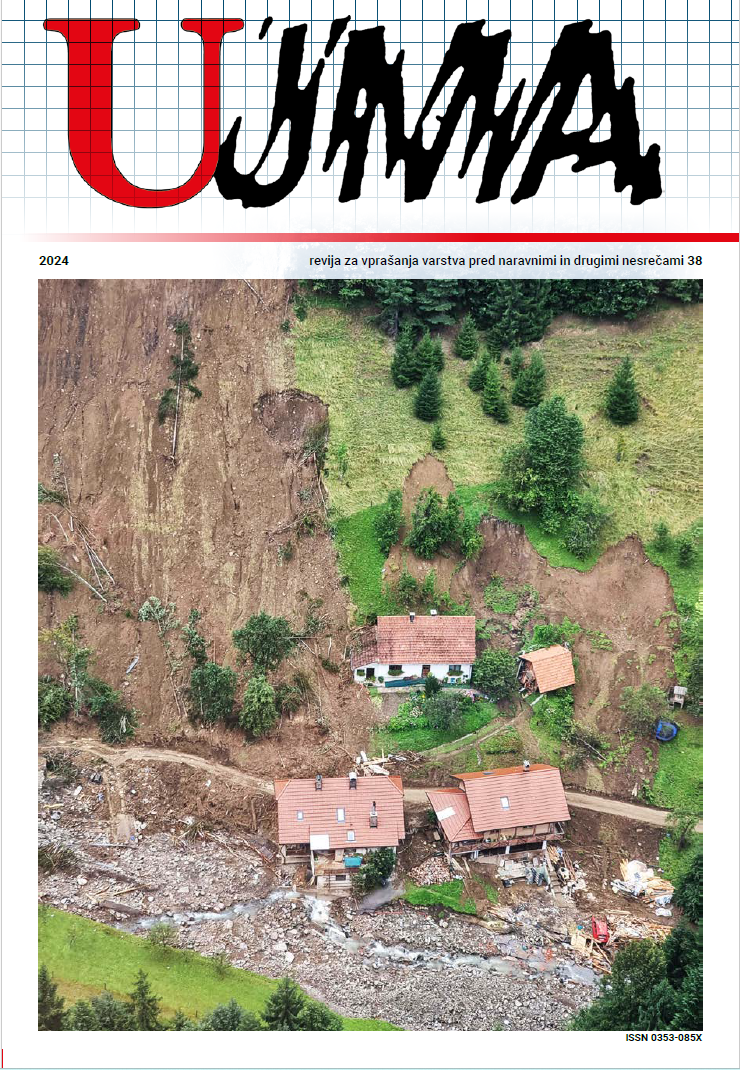EDUCATION FOR THE FUTURE: CLIMATE CHANGE AND EXTREME ENVIRONMENTAL EVENTS REQUIRE MORE TOPICS ON PROTECTION AND RESCUE IN THE CURRICULUM
Abstract
Social, technological and climate changes are occurring rapidly, but society is only reacting with a delay. Climate change brings more frequent extreme weather events and associated natural disasters. These events have caught us largely unprepared, not only in civil society but also in educational programmes. As a result, there is a growing need for students to understand how the system of protection against natural and other disasters works. To meet this need, we have been working with students from the University of Nova Gorica and colleagues from the Postojna Office of the Republic of Slovenia’s Administration for Civil Protection and Disaster Relief since 2022 to conduct simulations of the regional civil protection headquarters in the event of a natural disaster. The students’ response to these simulations has been positive and has shown that there is a lack of knowledge about the system of protection against natural and other disasters, and that there is a need to incorporate additional content on this topic into academic programmes and activities. For an effective system, two-way communication is crucial: scientific findings must be applied in practice and feedback from the field on its effectiveness is essential. Some universities are already active in this area and have developed specific programmes which are regularly updated.
References
Albers, S., Marynissen, H., van den Oord, S., 2024. Governing crises: establishing stability in fluidity. Antwerp Crisis Issue Paper, 1, 1-10.
Belay, B., Ambaw, G., Makonnen, B. T., Amha, Y., Demissie, T., Solomon, D., 2023. Streamlining climate education to tackle climate crisis: call for action to empower Ethiopia’s next generation with climate knowledge and build resilience. AICCRA Report. Accelerating Impacts of CGIAR Climate Research in Africa (AICCRA), https://hdl.handle.net/10568/135500, 20. 5. 2024.
Bradley, L., Heywood, E., 2024. Journalism as the fourth emergency service: trauma and resilience. New York, Peter Lang, 278 str.
Buma, B., Schultz, C., 2020. Disturbances as opportunities: learning from disturbance‐response parallels in social and ecological systems to better adapt to climate change. Journal of Applied Ecology, 57, 6, 1113–1123.
Cadiz, N. R. R., Mariano, K. L. S., Dumalag, J. B. L. C., Retamar, A. E., Aceron, J. C. F., 2023. Information, education, and communication campaign in the Philippines: capacitating academic institutions and government agencies using Geographic Information System, Radar Remote Sensing, and Artificial Intelligence. V: 2023 Asian Conference on Remote Sensing (ACRS2023), ID-2 Sustainability, Asian Association on Remote Sensing; Taipei, 1–9.
de Guzman, A. J. B., Godoy, A. M., Nicodemus, M. M. C., Ramos, L. L. F., Basilio, E. R., 2023. An assessment on the students’ level of earthquake awareness and preparedness on »The Big One«. International Journal of Environment, Engineering and Education, 5, 3, 87–99.
Elik, F., 2023. Earthquake damage detection with satellite imagery and deep learning approaches: A case study of the february 2023, Kahramanmaraş, Turkey earthquake sequence M.Sc. Thesis. Istanbul, Istanbul Technical University, 135 str.
Intergovernmental Panel on Climate Change (IPCC), 2022. Climate change 2022: Impacts, adaptation, and vulnerability. https://report.ipcc.ch/ar6wg2/pdf/IPCC_AR6_WGII_SummaryForPolicymakers.pdf, 30. 1. 2023.
IPCC, 2022. Climate change 2022: Impacts, adaptation, and vulnerability. https://report.ipcc.ch/ar6wg2/pdf/IPCC_AR6_WGII_SummaryForPolicymakers.pdf, 30. 1. 2023.
Khusulio, K., Kumar, R., 2023. Landslide impacting factors and susceptibility assessment in part of the Purvanchal Himalayas using data mining approaches. Arabian Journal of Geosciences, 16, 11, 612.
Osei-Kyei, R., Tam, V. W., Komac, U., Ampratwum, G., 2023. Review of the relationship management strategies for building flood disaster resilience through public–private partnership. Sustainability, 15, 13, 10089.
Seneviratne, S. I., Zhang, X., Adnan, M., Badi, W., Dereczynski, C., Di Luca, A., Ghosh, S., Iskander, I., Kossin, J., Lewis, S., Otto, F., 2021. Weather and climate extreme events in a changing climate. V: Masson-Delmotte in sod. (uredniki), Climate Change 2021: The physical science climate, contribution of working group I to the Sixth Assessment Report of the Intergovernmental Panel on Change, Cambridge, Cambridge University Press, 1513–1766.
Sulkowski, N., Towers, N., Fuller, M., 2024. Developing an innovative disaster resilience framework with universities as key agents–the value of consolidating international expertise. IOP Conference Series: Earth and Environmental Science, 1306, 012047.
Tomaszewski, B., 2020. Geographic information systems (GIS) for disaster management. Routledge, Taylor & Francis Group, 482 str.
Ulutaşdemir, N., Kulakaç, N., 2024. The Great Destruction − Turkey in the Earthquake of the Century: A Health Sector Perspective. Disaster Medicine And Public Health Preparedness, 18, e78.
United Nations, 2015. Sendai Framework for Disaster Risk Reduction 2015a–2030. Geneva, Switzerland: United Nations Office for Disaster Risk Reduction https://www.undrr.org/implementing-sendai-framework/what-sendai-framework, 20. 5. 2024.
Wen, J., Wan, C., Ye, Q., Yan, J. & Li, W., 2023. Disaster risk reduction, climate change adaptation and their linkages with sustainable development over the past 30 years: A review. International Journal of Disaster Risk Science, 14, 1, 1–13.
Downloads
Published
Issue
Section
License
Copyright (c) 2025 Ujma

This work is licensed under a Creative Commons Attribution-NonCommercial-NoDerivatives 4.0 International License.
The articles are made available to the public under Creative Commons Attribution-NonCommercial-NoDerivatives 4.0 International (CC BY-NC-ND 4.0).


